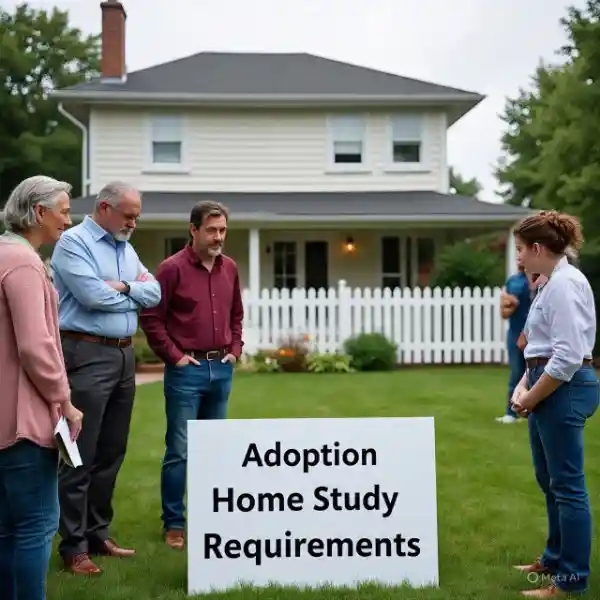Adoption Home Study Requirements You Need To Succeed Now

Here’s a statistic that surprises many prospective parents: almost 40% of families fail their first adoption home study attempt. This doesn’t mean they are unfit as parents; it often stems from a misunderstanding of the adoption home study requirements early on.
Many prospective families enter the process with the belief that it’s just a simple house inspection, only to realize it’s a thorough evaluation of their readiness to raise an adopted child.
The misconception that runs deep is that many believe that having a clean house and a stable income ensures approval. In reality, social workers evaluate emotional readiness, support systems, parenting philosophy, and how well families grasp the unique challenges of adoption.
Knowing these adoption home study requirements from the beginning will determine how fast or slow your approval process will go, and may also result in extra costs and emotional strain.
What Are Adoption Home Study Requirements?
Adoption home study requirements are evaluation standards that every prospective adoptive family must meet before being approved to adopt a child. These requirements are not arbitrary hurdles; they exist to make sure that children are placed in homes where they will thrive emotionally, physically, and developmentally.
The home study process is the same across all types of adoption, whether you’re pursuing domestic infant adoption, foster care adoption, or international adoption.
While some states or counties may have a little difference in what they require during the home study, there may be some elements that are generally the same: background checks, home safety evaluations, financial assessments, interviews, and documentation showing your readiness to parent an adopted child.
Consider it all as a detailed preparation process that helps both you and your future child. The social worker isn’t looking for perfection; they want to find parents who understand the complexities of adoption and have adequately prepared themselves.
Defining Adoption Eligibility Clearly:
Before we dive into specific adoption home study requirements, I would like you to understand the basic criteria for adoption. Age requirements range from 21 to 65 years old, although some agencies accept older applicants; you don’t need to be married. Single parents can adopt in most places, and many agencies support LGBTQ+ families.
Financial stability is another important adoption home study requirements requirements during the home study, however, you don’t need to be wealthy. The only thing the agencies want to see is that you are financially stable enough to cover all essential needs and adoption-related expenses.
Criminal background checks are also one of the adoption home study requirements, and let me clear this myth that all convictions will automatically disqualify you. Child abuse, and recent drug offenses can undoubtedly lead to denial, but minor infractions from long ago may not affect your eligibility.
The number one requirement from you as the prospective parents is your ability to parent in the long term. Serious mental health issues or physical disabilities are not immediate disqualifiers, but agencies need to understand how these factors could influence your parenting. It’s very necessary to show that you’ve addressed any challenges and have support systems in place.
Step One: Preparing Emotionally and Mentally:
One of the biggest fears most prospective adoptive families face is the stress and fear of being judged throughout the evaluation process.
Many parents feel like they’re “under a microscope,” and constantly fear that they could say or do something that could get them disqualified. This anxiety can work against you, making you seem unprepared or unsure.
A renowned licensed clinical social worker with expertise in adoption, Dr. Sarah Chen, says that mental preparation is very crucial: “Families who succeed understand that the home study isn’t about proving perfection—it’s about showing self-awareness and commitment to adoption-specific parenting.”
Actionable example: Start a daily journaling practice at least three months before your home study starts. Write about your motivations, fears, and expectations regarding adoption. Doing this will help you clarify your thoughts during interviews and show social workers that you have thoughtfully considered the adoption journey.
Many families have discovered that reviewing their journal entries before meetings boosts their confidence in communicating with their social worker.
Step Two: Gathering Your Documentation Early:
The paperwork process can be very overwhelming. Most families underestimate how much documentation is needed, leading to last-minute scrambles that delay everything. An adoption home study typically requires birth certificates, marriage certificates, divorce decrees, tax returns, employment verification, medical records, references, and more.
Adoption attorney Michael Rodriguez advises starting your document collection right away: “Families who succeed begin gathering paperwork before they even reach out to an agency. This is because they understood that some documents can take weeks to obtain, and having everything ready shows you are very organized and committed.”
Actionable example: Create a detailed checklist organized by document type and deadline.
Carefully gather all the signed copies, the required documents for international adoption if you choose that, and expiration dates for time-sensitive documents. Set calendar reminders to request documents that usually take 2-3 weeks to receive, like background checks or medical clearances. Many successful families use a dedicated filing system with labeled folders for each document category.
Step Three: Creating a Safe, Child-Ready Home:
Home safety inspections are part of the adoption home study requirements that makes many families anxious, as they picture social workers examining every corner closely.
In reality, safety checks focus on practical child safety measures: working smoke detectors, secure medication storage, outlet covers, stair gates, and general cleanliness.
The issue here is perfectionism. Many adopting families usually worry about having a picture-perfect home when social workers prefer to see a lived-in space that has been thoughtfully childproofed. Your home should feel nice and welcoming for a child, not like a museum.
Actionable example: Conduct a room-by-room safety check using your state’s official safety checklist. Install smoke detectors on every level, lock up all cleaning supplies and medications, cover electrical outlets, and most of all, ensure all firearms are stored properly according to state laws.
Take photos of all that has been done about the safety of your house; this documentation can speed up the inspection process as it demonstrates your thoroughness.
Step Four: Financial Transparency Matters:

Money worries can paralyze prospective parents. Many prospective adoptive parents think that they need to be very rich to adopt, but agencies actually seek financial stability and transparency. The adoption social workers want to ensure that you can comfortably cover basic living expenses, have some savings for emergencies, and are aware of adoption-related costs.
Licensed social worker and adoption specialist Jennifer Martinez explains: “We’re not looking for wealthy families; we’re looking for financially responsible families who have planned for the costs of raising a child, including possible therapy, medical needs, or educational support that adopted children may require.”
Actionable example: Organize your financial documents in a clear presentation format. Create a monthly budget that includes expected child-related expenses, compile six months of bank statements, and prepare a simple explanation of your financial planning for adoption costs.
If you have debt, make a realistic payoff plan. Being transparent about financial challenges, along with concrete solutions, actually strengthens your application.
Step Five: Showing Family and Community Support:
Families without a support network face challenges during the home study. Social workers look for family, friends, mentors, or community members who back your adoption decision and can help you as a parent. The concern is that your support system isn’t “impressive enough” or large enough.
Child welfare specialist Dr. Amanda Foster states: “Strong support systems are about quality, not quantity. I’ve seen single parents with two close friends succeed beautifully, while couples with large families struggle because their relationships lack depth or support for adoption.”
Actionable example: Ask for letters of reference from at least five people who know you well and support your adoption decision. Include a mix of family members, close friends, employers, religious leaders, or mentors.
Request that each person address specific aspects like their character, parenting potential, and their commitment to supporting your family. Provide talking points on why you want to adopt and the type of support you hope to receive.
Step Six: The Interview Process with Confidence:
The interview stage intimidates many families because they feel like they’re “on trial.” Social workers conduct several interviews—individual sessions with each parent, joint interviews, and sometimes family interviews if you have other children. The issue is feeling judged instead of understood.
Adoption counselor Rebecca Kim highlights authenticity: “The worst thing families can do is try to give ‘perfect’ answers. We want to see real people with real motivations, concerns, and realistic expectations about adoption challenges.”
Actionable example: Practice interview questions with your partner or a trusted friend acting as the social worker, and discuss your childhood experiences, your parenting ideas, stress management skills, and why you choose to adopt. Record yourself or ask for feedback on your responses.
Concentrate on honest, thoughtful answers and don’t try to sound perfect. Many adoptive families discovered that practicing helps them feel more relaxed and confident during the actual interviews.
Step Seven: Demonstrating Parenting Readiness:
The biggest concern for many families is the fear of “not being good enough” as future parents. This fear grows when discussing topics like discipline, attachment, trauma-informed parenting, and adoption-specific challenges such as identity formation and birth family relationships.
Dr. Rachel Thompson, who trains social workers in adoption assessment, explains: “We’re not seeking parenting experts—we want parents who understand that adopted children may have unique needs and who are committed to learning and growing alongside their child.”
Actionable example: Sign up for adoption-focused parenting classes or workshops before your home study begins. You may have the opportunity to learn about trauma-informed parenting, attachment theory, transracial adoption considerations, and how to maintain birth family connections. Document your attendance and key takeaways.
This preparation will show the social workers that you understand that adoptive parenting is very different from biological parenting and that you’re committed to addressing your child’s specific needs.
Common Mistakes Families Make in the Process:
Understanding potential pitfalls can help you steer clear of them. The first major mistake you can make is to prepare so much that you appear rigid or controlling to the caseworker.
Don’t make the mistakes of creating elaborate presentations or rehearsing answers so thoroughly that they sound scripted instead of genuine. On the other hand, unpreparedness by assuming “love is enough” without grasping the complexities of adoption can also lead to delays.
The second significant mistake is not saying the truth about your past, relationships, or concerns. Social workers are trained to know when they are inconsistent, and failing to disclose information can irreparably damage trust.
Whether it’s a previous bankruptcy, a mental health issue, or family conflict, try to address these issues honestly with context and solutions, which shows maturity.
The third mistake is not acknowledging expert guidance from your agency, attorney, or social worker. Some families conduct extensive online research and arrive with rigid expectations about how the process should go. Flexibility and a willingness to follow professional advice significantly enhance your chances of success.
Lessons From Industry Experts:
Adoption professionals emphasize the need for preparation and sincerity. Maria Santos, Director of Family Services at a major adoption agency, says, “Families who succeed understand that the home study marks the start of their adoption education, not a test to pass. They see it as a partnership with us in finding the right match for their family.”
Adoption attorney James Burke adds, “Families often aim to meet the bare minimum when they should focus on showing optimal readiness. The difference lies in how deeply they prepare; successful families go beyond just checking boxes to genuinely understanding what they are undertaking.”
Child psychologist Dr. Lisa Park, who frequently works with adoptive families, points out, “The home study process reveals whether families understand that adopted children often need additional emotional support. All the families who acknowledge this on time and prepare effectively for it create the strongest applications.”
Your Next Steps to Succeed in Home Study:
Success in meeting adoption home study requirements relies on early preparation, honest self-evaluation, and recognizing that this process ultimately supports your future child’s well-being. Start by choosing a reputable agency or social worker who clearly states their specific requirements.
Start on time to gather all the necessary documents, even if you have several months before starting the formal process. Spend time to have more knowledge about adoption through books, workshops, and connecting with other adoptive families. Take proactive steps to resolve any potential issues, and seek professional help when needed.
Remember that the social worker wants to approve you; their goal is to help suitable families, not to find reasons to deny them. Approach the process as a partnership focused on preparing you for the unique joys and challenges of adoption.
The Emotional Cost of Inaction:
Every month you wait to understand and prepare for the adoption home study requirements means another month your future child waits for a family. The statistics are concerning: children who age out of foster care face much higher risks of homelessness, unemployment, and mental health issues.
When you’re ready for the home study process, you’re not just fulfilling bureaucratic requirements; you’re actively working to give a child the stable, loving home they need.
The financial cost of delays adds up quickly. For example, a rejected home study will attract another payment for re-evaluation, which can be between $1,000 and $3,000 extra. Longer timelines mean more emotional stress for your whole family and may even lead to missing chances to connect with birth mothers or available children who meet your preferences.
But the biggest cost is emotional. Every family that has successfully gone through the adoption process shares the same regret: they wish they had started preparing sooner. The months spent researching, stressing, and hesitating could have been months spent actively working to bring their child home.
The choice is yours, but time is against both you and the children waiting for families. Start your preparation today. Gather your documents, connect with professionals, and take the first concrete step toward meeting adoption home study requirements. Your future child is waiting for you to take action now, not your good intentions later.
Frequently Asked Questions:
How long does an adoption home study take to complete?
Most adoption home studies take about 3 to 6 months from the day you start to the approval date. However, the timeline depends on your state’s requirements and how quickly you provide the needed documents.
International adoptions may take longer due to extra requirements. Delays often happen if families haven’t gathered the necessary paperwork ahead of time or need to tackle issues that come up during the evaluation.
What happens if I don’t pass the home study on the first attempt?
When you fail your home study, it is not the end of the road or a permanent rejection; most times, the social workers will give specific reasons for that and areas that need improvement, such as extra safety measures, financial planning, or more education about adoption.
Most families that fail initially can reapply after addressing the identified issues, but this adds months to your timeline and more costs.
Do international adoptions have different home study requirements than domestic adoptions?
International adoptions typically require more thorough documentation. This includes country-specific requirements, apostilled documents, and sometimes extra training or education.
However, the main evaluation areas—safety, stability, and parenting readiness—stay the same. Your social worker will explain any additional requirements specific to your chosen country’s adoption program.





